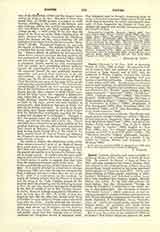

Daniel, CHARLES.—b. December 31, 1818, at Beauvais, France; d. January 1, 1893, at Paris. He joined the Society of Jesus in 1841, was professor of rhetoric in the novitiate at Saint Acheul, and in 1857, with the assistance of Father Gagarin, founded the “Etudes de theologie et d’histoire”, a magazine that soon became a monthly publication. Father Daniel edited it with ability until 1870. He was a man of extensive and accurate learning, of unquestionable taste, and he had an unusually receptive and assimilative mind. He contributed to the “Etudes” many articles on philosophical subjects: “Optimism” (1859), “Positivism” (1860), “Leibniz and Saisset” (1861), “The Vatican Council” (1869-1870); “Protestantism: the Crisis of Protestantism in France” (1862), “The Organization of Protestants in France” (1863); biographies of Pere Beauregard (1858), Mme. Swetchine (1864), Ch. Lenormand (1860), and P. Leon Ducoudray, martyr of the Paris Commune (1892).
Other more important works are: “Des Etudes classiques dans la societe Chretienne” (1853); “Histoire de la bienheureuse Marguerite Marie et des origins de la devotion au Sacre Coeur” (1865), translated into Italian, Polish, and Chinese; “La vie du P. Alexis Clerc, marin et Jesuite” (1876, English tr., New York, 1880), and “Les Jesuites instituteurs de la jeunesse au XVIIe et au XVIIIe siecle” (1880). His “Questions actuelles: religion, philosophie, histoire, art et litterature “is preceded by a sketch of the author by Fathers Mercier and Fontaine, S.J. (Poitiers, 1895).
MERCIER. J. LIONNET.

